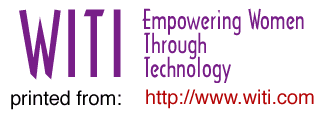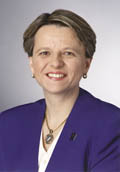
 Irene Dec
Irene Dec
Vice President, Information Systems
The Prudential Insurance Company of America
Irene Dec, vice president, Information Systems, joined Prudential in
1981 in Information Systems. Currently, Dec is Prudential's Year 2000
Program Manager, leading Prudential's Year 2000 Company-wide Program
Office, which includes all Prudential systems, infrastructure, and
external relationships with clients and business partners.
In 1998 Dec was named one of "25 IT People to Watch" by ComputerWorld
and selected as one of 26 "Intriguing Woman of New Jersey Business" by
Business News. Dec was also one of the first three honorees inducted
into the Year 2000 Hall of Fame (sponsored by SPG Conferences &
Expositions and the Society for Information Management). She was
also profiled in the 1999 Women in Science and Technology Month, sponsored by
Women in Technology International. Dec has presented at over sixty
Year 2000 conferences and seminars and consulted with other major U.S.
companies and government agencies. She has been quoted in publications
and technical magazines including Beyond Computing, CIO, ComputerWorld,
InformationWeek, PC Week, and Year/2000 Journal. She has appeared on
ABC's World News Tonight and on CNN News discussing Year 2000 issues.
Dec received her BS and MS in mathematics from Montclair State
University, New Jersey. Before joining Prudential, her previous work
experiences included teaching mathematics, both at a high school and at
a college level. Dec is a member of the World Future Society, Project
Management Institute, ACM Association for Computing Machinery, NAFE
National Association for Female Executives, and IEEE Association for
Computing.
1. What was your first job in technology?
2. Who has been your most significant mentor? Why?
Albert Einstein is also someone that I respect highly. He once said, "In
the middle of difficulty lies opportunity." This is an excellent
description of how Prudential managed the Year 2000 project. We not only
addressed being "Y2K ready," but also looked long-term for implementing
processes and obtaining strategic opportunities.
3. What has been your greatest challenge and what strategies did you use to overcome obstacles?
Year 2000 remediation presented many challenges that had to be
addressed. When the project was begun at Prudential with strong
executive support, I set up a central program office to manage the
project across Prudential's several lines of business in order to ensure
a consistent approach and methodology. One of the early challenges was
getting an accurate profile of the application, infrastructure, and
business partner inventories. Processes were put in place to gather this
information, assess Year 2000 readiness, implement project plans, and
track progress against plan through the use of rigorous metrics.
Contingency plans had to be identified, coordinated, and prepared in
case systems experienced Year 2000 problems. A Year 2000 Global Control
Center was established within Prudential's existing Operations and
Control Center to serve as the single point of contact for reporting all
Year 2000 problems and driving them to resolution. Tight project
management, timely resolution of problems, and rigorous metrics to track
progress against plan helped Prudential's Year 2000 program to achieve
its goals.
4. Who has been the most influential person in your life? Why?
5. What lessons have you learned that would be valuable to women beginning their careers in technology?
6. What new technology do you believe will have the most positive impact on the world in the next 20 years? The most negative impact?
The most negative impact will be caused by a lack of security in
technological environments. New strategies and rigorous standards are
required.
Over the next ten or twenty years, I expect to see a concentrated and
mandatory approach toward application development methodology and
processes. I suspect that Information Engineering will achieve the
engineering discipline required to enable business success.
On a lighter note:
2. What was the last book you read? What books do you love to recommend?
3. If you were to choose a different profession, what would it be?
4. What is your definition of success?
I started my career in technology at Prudential as a COBOL programmer.
However, my first job was as an educator. I taught mathematics at both
high school and college levels.
Grace Murray Hopper is a person that I very much admire. Hopper made
significant contributions to the field of computer programming: she
conceptualized the notion of code libraries, developed the first
compiler, and was instrumental in developing COBOL. But besides her
influence in the world of technology, Hopper was absolutely committed to
young people. She often remarked that youth are our future, and
considered that her most important job was educating young people.
My greatest challenge was managing the company-wide Year 2000 project
for Prudential. Year 2000 was the largest and most challenging project
that Information Technology has ever faced.
My parents are the most influential people in my life. They taught me
the value of hard work and accomplishment. Both my parents considered
learning and education very important. My parents had come from Poland
after World War II. As a first generation American student, I was
encouraged to study harder and learn more. My father often told me to
"learn something new every day." Because of their example, I believe
that if you go after your dreams, you can accomplish whatever you set
out to do.
I advise women to take advantage of the opportunities that Information
Technology offers and will continue to offer in the global market. There
are excellent opportunities for women today in the fields of science and
technology; their skills are needed. It is important for women thinking
about a technology career to develop their math and science skills. They
need to believe in themselves, in their qualifications and capabilities,
and then they need to go after their dreams. The world of technology and
the ability to enable successful business through technology require
"brain power," which implies that women, who represent approximately
fifty percent of the population, must be equally represented as
technology leaders and resources.
I think that the most positive impact will be made by e-commerce.
Technologies that enable Internet and mobile computing services for
customers, that allow them to gather research information, trade
securities online, receive insurance quotes, check their credit card
balances, find a home, and manage their retirement accounts will change
the way business is conducted throughout the world.
1. If you could have dinner with any 2 people (living or not), who would they be?
Grace Murray Hopper
Euclid
I tend to read philosophy, science, and business books. I recently
finished reading Dava Sobel's book, "Longitude: The True Story of a Lone
Genius Who Solved the Greatest Scientific Problem of His Time." It's the
story of an eighteenth-century clock maker, John Harrison, who worked
out a solution to the problem of determining longitude at sea. He built
the first successful chronometer and continued improving his invention
throughout his life.
I would return to teaching. I am deeply committed to education and
working with students. I enjoy helping other people learn the skills
they need to carry them through life. Young people today need good
mentors, who understand the world of business from the inside, who can
challenge them to be their best by helping them identify their skills
and talents and develop them for competition in the global marketplace.
Success is:
Personally: Being happy and peaceful in mind and spirit.
Business: Implementing and driving business directions at near "the
speed of light."
|
For more 'WITI Women' articles, go to: http://www.witi.com/wire/witiwomen/ For all the latest news and information on women in technology, visit http://www.witi.com |